International Decision-Making in Emerging Markets: Indonesia Case
VerifiedAdded on 2023/06/14
|9
|2041
|173
Essay
AI Summary
This essay explores the challenges faced by managers in making business decisions in Indonesia, an emerging economy, due to various macro-environmental factors. It discusses pitfalls related to political and legislative issues, social and market structure factors, and communication and technology-related difficulties. The analysis covers Indonesia's political system, labor laws, tax complexities, and market structures, including perfect competition, monopoly, and oligopoly. It also addresses the country's struggle to integrate information and communication technologies, affecting business operations and information collection. The essay concludes that managers must analyze the external environment and collect information from reliable sources to exploit Indonesia's growth potential effectively. Desklib provides access to similar solved assignments and resources for students.
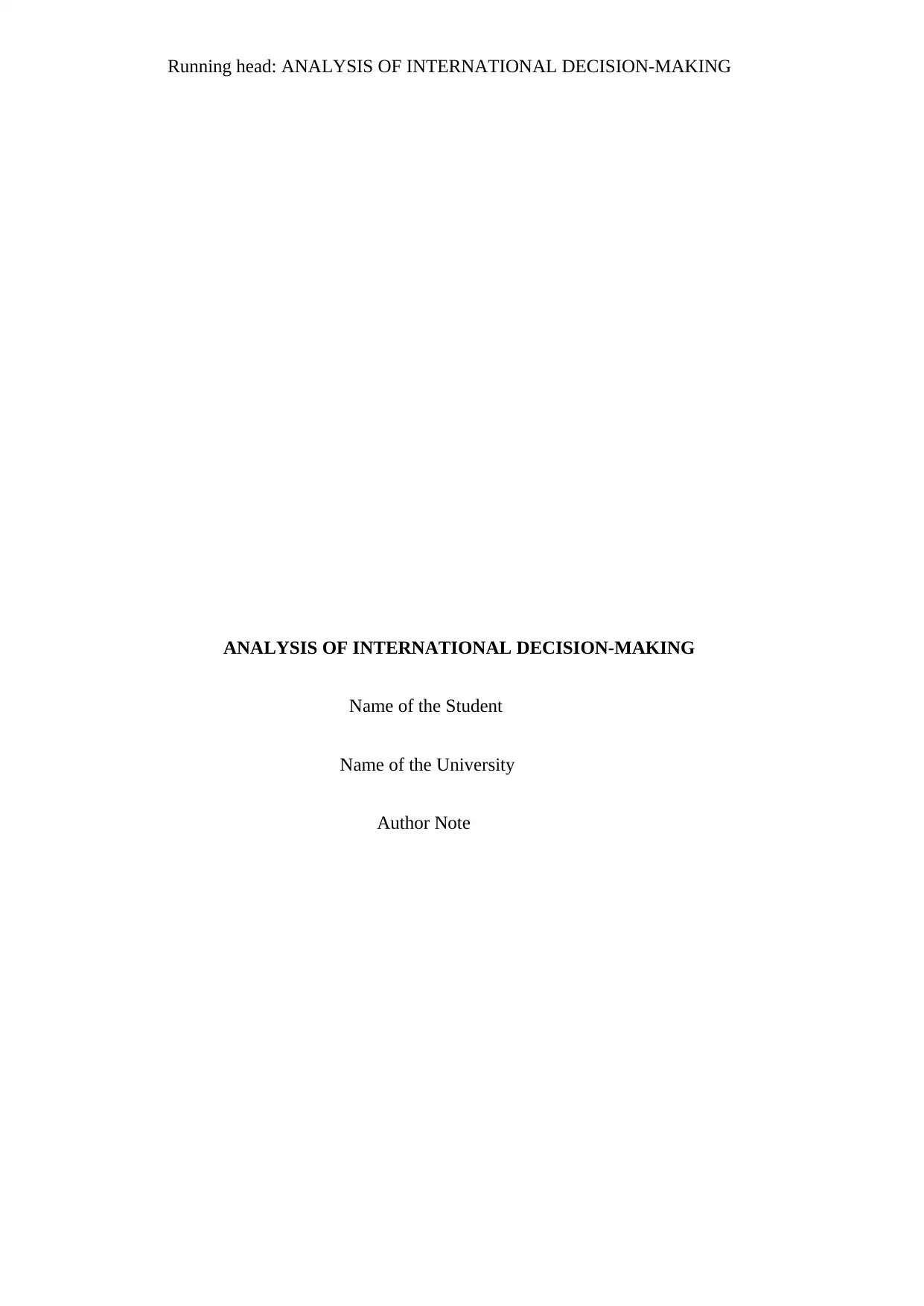
Running head: ANALYSIS OF INTERNATIONAL DECISION-MAKING
ANALYSIS OF INTERNATIONAL DECISION-MAKING
Name of the Student
Name of the University
Author Note
ANALYSIS OF INTERNATIONAL DECISION-MAKING
Name of the Student
Name of the University
Author Note
Paraphrase This Document
Need a fresh take? Get an instant paraphrase of this document with our AI Paraphraser
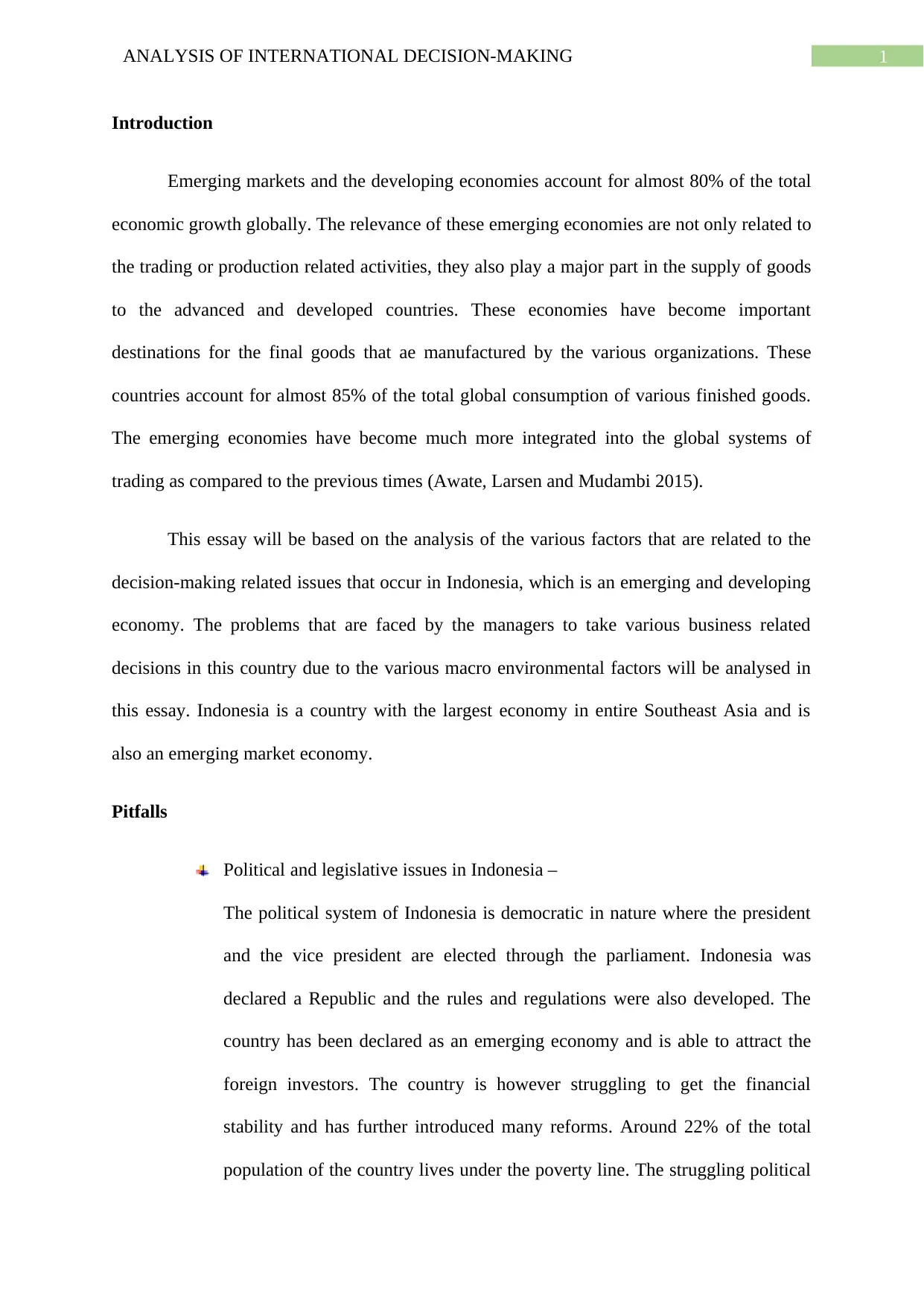
1ANALYSIS OF INTERNATIONAL DECISION-MAKING
Introduction
Emerging markets and the developing economies account for almost 80% of the total
economic growth globally. The relevance of these emerging economies are not only related to
the trading or production related activities, they also play a major part in the supply of goods
to the advanced and developed countries. These economies have become important
destinations for the final goods that ae manufactured by the various organizations. These
countries account for almost 85% of the total global consumption of various finished goods.
The emerging economies have become much more integrated into the global systems of
trading as compared to the previous times (Awate, Larsen and Mudambi 2015).
This essay will be based on the analysis of the various factors that are related to the
decision-making related issues that occur in Indonesia, which is an emerging and developing
economy. The problems that are faced by the managers to take various business related
decisions in this country due to the various macro environmental factors will be analysed in
this essay. Indonesia is a country with the largest economy in entire Southeast Asia and is
also an emerging market economy.
Pitfalls
Political and legislative issues in Indonesia –
The political system of Indonesia is democratic in nature where the president
and the vice president are elected through the parliament. Indonesia was
declared a Republic and the rules and regulations were also developed. The
country has been declared as an emerging economy and is able to attract the
foreign investors. The country is however struggling to get the financial
stability and has further introduced many reforms. Around 22% of the total
population of the country lives under the poverty line. The struggling political
Introduction
Emerging markets and the developing economies account for almost 80% of the total
economic growth globally. The relevance of these emerging economies are not only related to
the trading or production related activities, they also play a major part in the supply of goods
to the advanced and developed countries. These economies have become important
destinations for the final goods that ae manufactured by the various organizations. These
countries account for almost 85% of the total global consumption of various finished goods.
The emerging economies have become much more integrated into the global systems of
trading as compared to the previous times (Awate, Larsen and Mudambi 2015).
This essay will be based on the analysis of the various factors that are related to the
decision-making related issues that occur in Indonesia, which is an emerging and developing
economy. The problems that are faced by the managers to take various business related
decisions in this country due to the various macro environmental factors will be analysed in
this essay. Indonesia is a country with the largest economy in entire Southeast Asia and is
also an emerging market economy.
Pitfalls
Political and legislative issues in Indonesia –
The political system of Indonesia is democratic in nature where the president
and the vice president are elected through the parliament. Indonesia was
declared a Republic and the rules and regulations were also developed. The
country has been declared as an emerging economy and is able to attract the
foreign investors. The country is however struggling to get the financial
stability and has further introduced many reforms. Around 22% of the total
population of the country lives under the poverty line. The struggling political
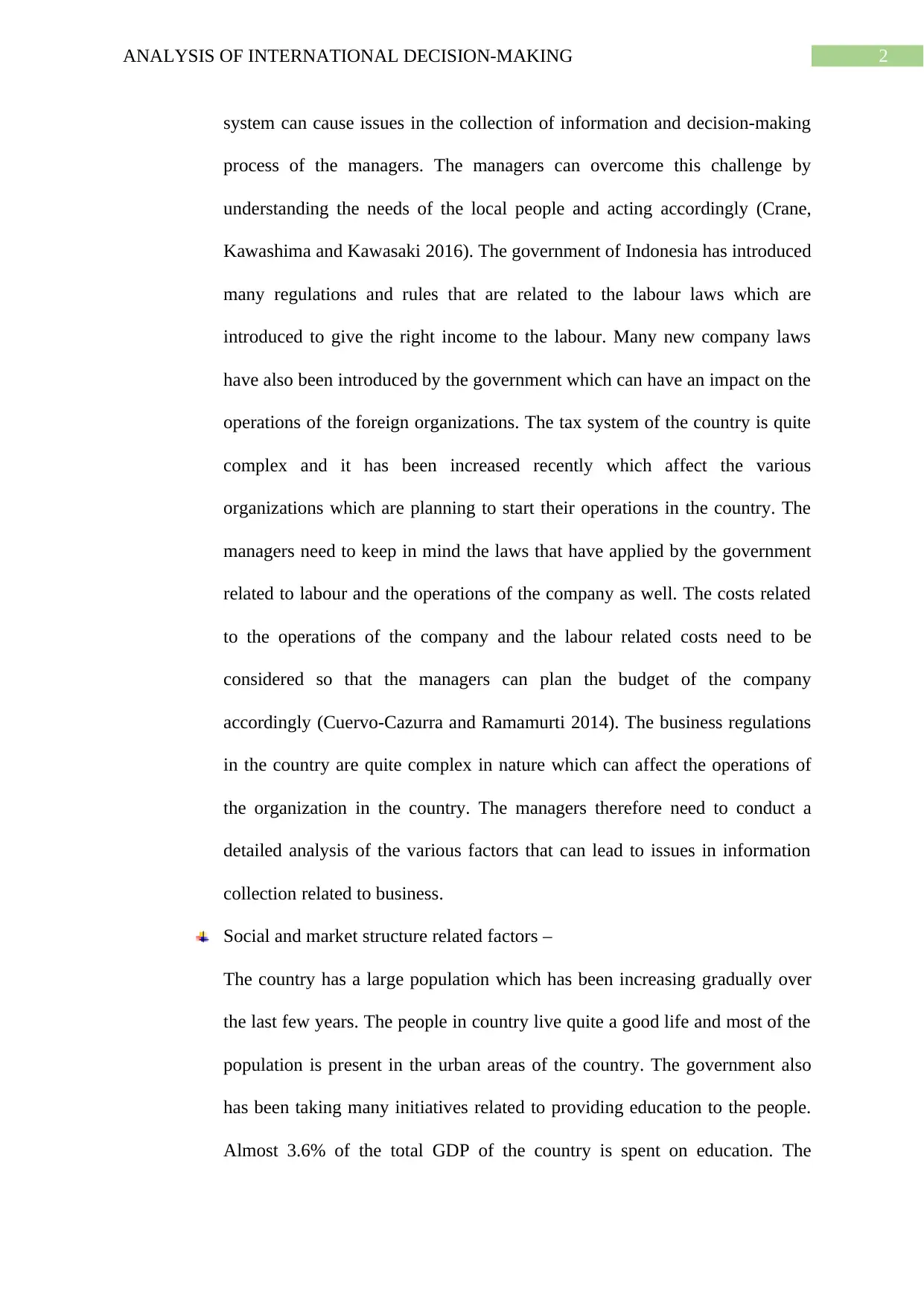
2ANALYSIS OF INTERNATIONAL DECISION-MAKING
system can cause issues in the collection of information and decision-making
process of the managers. The managers can overcome this challenge by
understanding the needs of the local people and acting accordingly (Crane,
Kawashima and Kawasaki 2016). The government of Indonesia has introduced
many regulations and rules that are related to the labour laws which are
introduced to give the right income to the labour. Many new company laws
have also been introduced by the government which can have an impact on the
operations of the foreign organizations. The tax system of the country is quite
complex and it has been increased recently which affect the various
organizations which are planning to start their operations in the country. The
managers need to keep in mind the laws that have applied by the government
related to labour and the operations of the company as well. The costs related
to the operations of the company and the labour related costs need to be
considered so that the managers can plan the budget of the company
accordingly (Cuervo-Cazurra and Ramamurti 2014). The business regulations
in the country are quite complex in nature which can affect the operations of
the organization in the country. The managers therefore need to conduct a
detailed analysis of the various factors that can lead to issues in information
collection related to business.
Social and market structure related factors –
The country has a large population which has been increasing gradually over
the last few years. The people in country live quite a good life and most of the
population is present in the urban areas of the country. The government also
has been taking many initiatives related to providing education to the people.
Almost 3.6% of the total GDP of the country is spent on education. The
system can cause issues in the collection of information and decision-making
process of the managers. The managers can overcome this challenge by
understanding the needs of the local people and acting accordingly (Crane,
Kawashima and Kawasaki 2016). The government of Indonesia has introduced
many regulations and rules that are related to the labour laws which are
introduced to give the right income to the labour. Many new company laws
have also been introduced by the government which can have an impact on the
operations of the foreign organizations. The tax system of the country is quite
complex and it has been increased recently which affect the various
organizations which are planning to start their operations in the country. The
managers need to keep in mind the laws that have applied by the government
related to labour and the operations of the company as well. The costs related
to the operations of the company and the labour related costs need to be
considered so that the managers can plan the budget of the company
accordingly (Cuervo-Cazurra and Ramamurti 2014). The business regulations
in the country are quite complex in nature which can affect the operations of
the organization in the country. The managers therefore need to conduct a
detailed analysis of the various factors that can lead to issues in information
collection related to business.
Social and market structure related factors –
The country has a large population which has been increasing gradually over
the last few years. The people in country live quite a good life and most of the
population is present in the urban areas of the country. The government also
has been taking many initiatives related to providing education to the people.
Almost 3.6% of the total GDP of the country is spent on education. The
⊘ This is a preview!⊘
Do you want full access?
Subscribe today to unlock all pages.

Trusted by 1+ million students worldwide
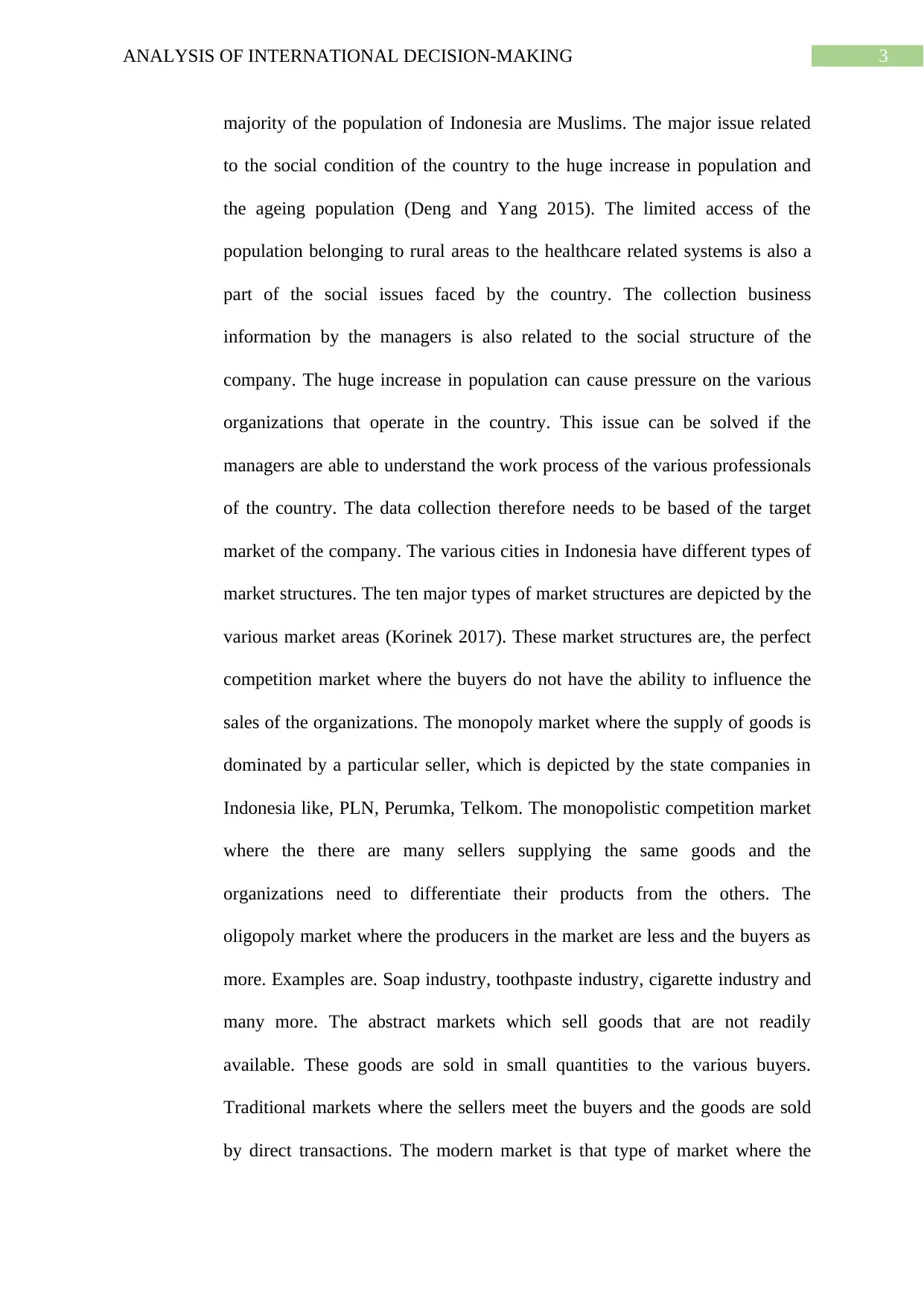
3ANALYSIS OF INTERNATIONAL DECISION-MAKING
majority of the population of Indonesia are Muslims. The major issue related
to the social condition of the country to the huge increase in population and
the ageing population (Deng and Yang 2015). The limited access of the
population belonging to rural areas to the healthcare related systems is also a
part of the social issues faced by the country. The collection business
information by the managers is also related to the social structure of the
company. The huge increase in population can cause pressure on the various
organizations that operate in the country. This issue can be solved if the
managers are able to understand the work process of the various professionals
of the country. The data collection therefore needs to be based of the target
market of the company. The various cities in Indonesia have different types of
market structures. The ten major types of market structures are depicted by the
various market areas (Korinek 2017). These market structures are, the perfect
competition market where the buyers do not have the ability to influence the
sales of the organizations. The monopoly market where the supply of goods is
dominated by a particular seller, which is depicted by the state companies in
Indonesia like, PLN, Perumka, Telkom. The monopolistic competition market
where the there are many sellers supplying the same goods and the
organizations need to differentiate their products from the others. The
oligopoly market where the producers in the market are less and the buyers as
more. Examples are. Soap industry, toothpaste industry, cigarette industry and
many more. The abstract markets which sell goods that are not readily
available. These goods are sold in small quantities to the various buyers.
Traditional markets where the sellers meet the buyers and the goods are sold
by direct transactions. The modern market is that type of market where the
majority of the population of Indonesia are Muslims. The major issue related
to the social condition of the country to the huge increase in population and
the ageing population (Deng and Yang 2015). The limited access of the
population belonging to rural areas to the healthcare related systems is also a
part of the social issues faced by the country. The collection business
information by the managers is also related to the social structure of the
company. The huge increase in population can cause pressure on the various
organizations that operate in the country. This issue can be solved if the
managers are able to understand the work process of the various professionals
of the country. The data collection therefore needs to be based of the target
market of the company. The various cities in Indonesia have different types of
market structures. The ten major types of market structures are depicted by the
various market areas (Korinek 2017). These market structures are, the perfect
competition market where the buyers do not have the ability to influence the
sales of the organizations. The monopoly market where the supply of goods is
dominated by a particular seller, which is depicted by the state companies in
Indonesia like, PLN, Perumka, Telkom. The monopolistic competition market
where the there are many sellers supplying the same goods and the
organizations need to differentiate their products from the others. The
oligopoly market where the producers in the market are less and the buyers as
more. Examples are. Soap industry, toothpaste industry, cigarette industry and
many more. The abstract markets which sell goods that are not readily
available. These goods are sold in small quantities to the various buyers.
Traditional markets where the sellers meet the buyers and the goods are sold
by direct transactions. The modern market is that type of market where the
Paraphrase This Document
Need a fresh take? Get an instant paraphrase of this document with our AI Paraphraser
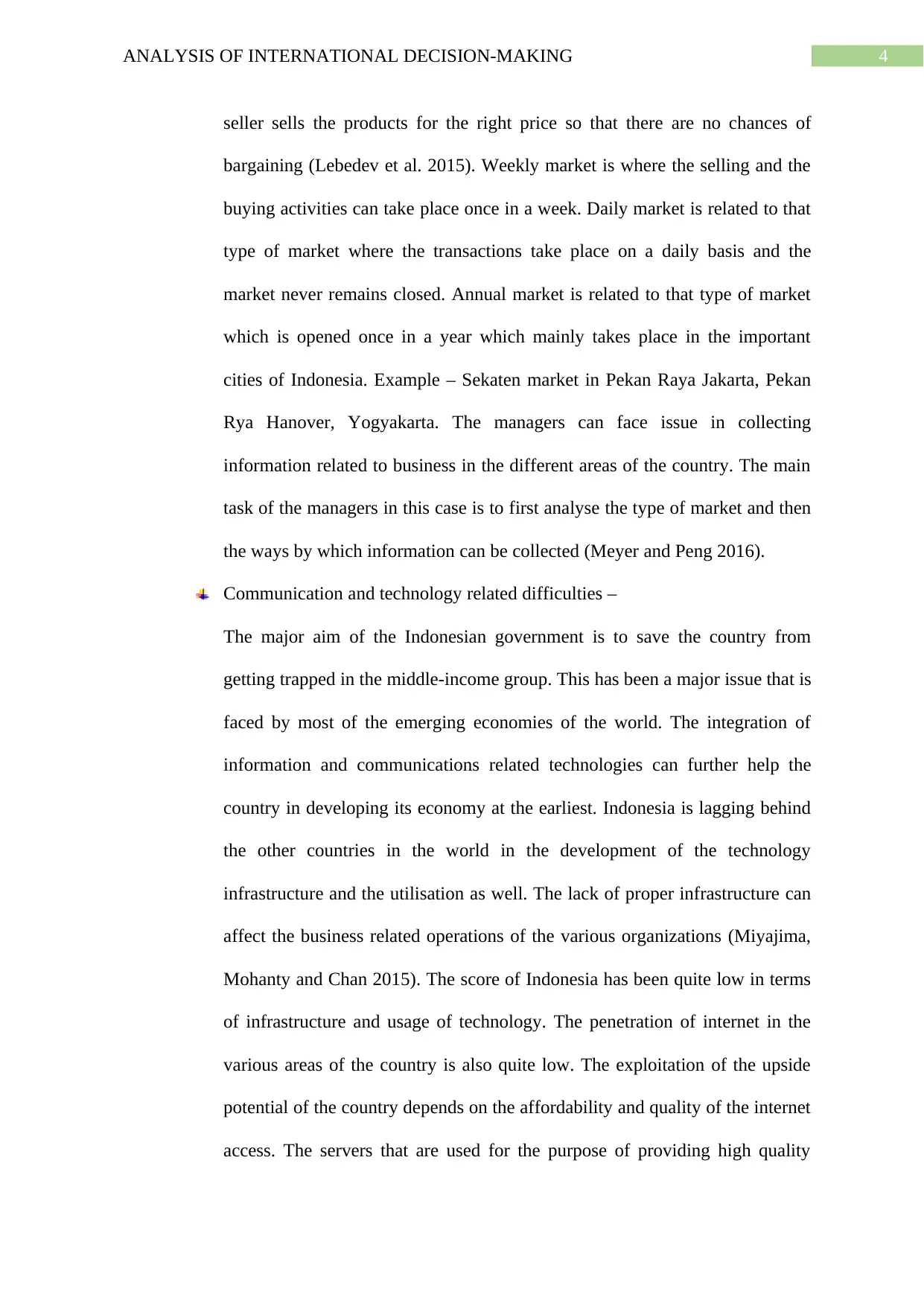
4ANALYSIS OF INTERNATIONAL DECISION-MAKING
seller sells the products for the right price so that there are no chances of
bargaining (Lebedev et al. 2015). Weekly market is where the selling and the
buying activities can take place once in a week. Daily market is related to that
type of market where the transactions take place on a daily basis and the
market never remains closed. Annual market is related to that type of market
which is opened once in a year which mainly takes place in the important
cities of Indonesia. Example – Sekaten market in Pekan Raya Jakarta, Pekan
Rya Hanover, Yogyakarta. The managers can face issue in collecting
information related to business in the different areas of the country. The main
task of the managers in this case is to first analyse the type of market and then
the ways by which information can be collected (Meyer and Peng 2016).
Communication and technology related difficulties –
The major aim of the Indonesian government is to save the country from
getting trapped in the middle-income group. This has been a major issue that is
faced by most of the emerging economies of the world. The integration of
information and communications related technologies can further help the
country in developing its economy at the earliest. Indonesia is lagging behind
the other countries in the world in the development of the technology
infrastructure and the utilisation as well. The lack of proper infrastructure can
affect the business related operations of the various organizations (Miyajima,
Mohanty and Chan 2015). The score of Indonesia has been quite low in terms
of infrastructure and usage of technology. The penetration of internet in the
various areas of the country is also quite low. The exploitation of the upside
potential of the country depends on the affordability and quality of the internet
access. The servers that are used for the purpose of providing high quality
seller sells the products for the right price so that there are no chances of
bargaining (Lebedev et al. 2015). Weekly market is where the selling and the
buying activities can take place once in a week. Daily market is related to that
type of market where the transactions take place on a daily basis and the
market never remains closed. Annual market is related to that type of market
which is opened once in a year which mainly takes place in the important
cities of Indonesia. Example – Sekaten market in Pekan Raya Jakarta, Pekan
Rya Hanover, Yogyakarta. The managers can face issue in collecting
information related to business in the different areas of the country. The main
task of the managers in this case is to first analyse the type of market and then
the ways by which information can be collected (Meyer and Peng 2016).
Communication and technology related difficulties –
The major aim of the Indonesian government is to save the country from
getting trapped in the middle-income group. This has been a major issue that is
faced by most of the emerging economies of the world. The integration of
information and communications related technologies can further help the
country in developing its economy at the earliest. Indonesia is lagging behind
the other countries in the world in the development of the technology
infrastructure and the utilisation as well. The lack of proper infrastructure can
affect the business related operations of the various organizations (Miyajima,
Mohanty and Chan 2015). The score of Indonesia has been quite low in terms
of infrastructure and usage of technology. The penetration of internet in the
various areas of the country is also quite low. The exploitation of the upside
potential of the country depends on the affordability and quality of the internet
access. The servers that are used for the purpose of providing high quality
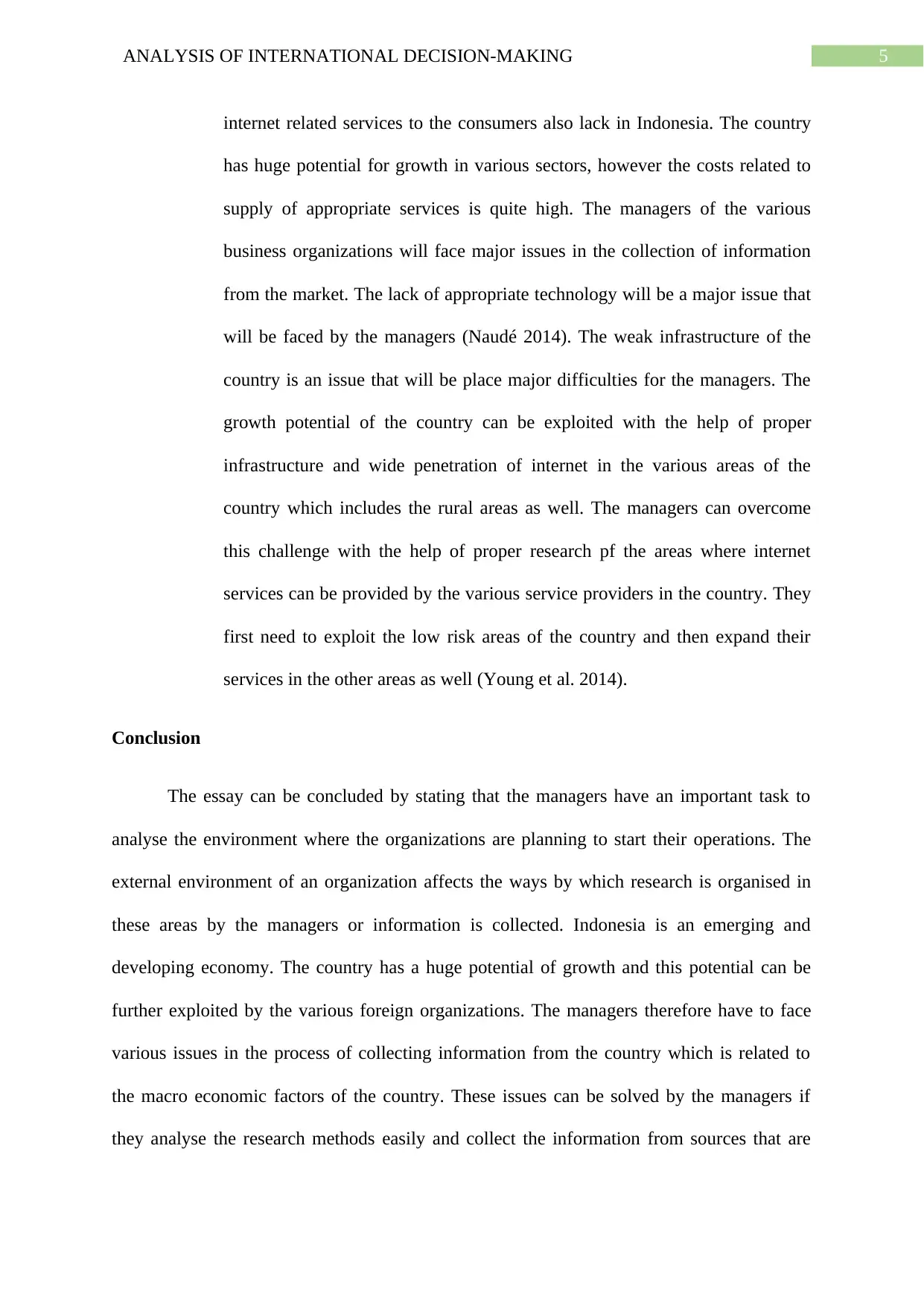
5ANALYSIS OF INTERNATIONAL DECISION-MAKING
internet related services to the consumers also lack in Indonesia. The country
has huge potential for growth in various sectors, however the costs related to
supply of appropriate services is quite high. The managers of the various
business organizations will face major issues in the collection of information
from the market. The lack of appropriate technology will be a major issue that
will be faced by the managers (Naudé 2014). The weak infrastructure of the
country is an issue that will be place major difficulties for the managers. The
growth potential of the country can be exploited with the help of proper
infrastructure and wide penetration of internet in the various areas of the
country which includes the rural areas as well. The managers can overcome
this challenge with the help of proper research pf the areas where internet
services can be provided by the various service providers in the country. They
first need to exploit the low risk areas of the country and then expand their
services in the other areas as well (Young et al. 2014).
Conclusion
The essay can be concluded by stating that the managers have an important task to
analyse the environment where the organizations are planning to start their operations. The
external environment of an organization affects the ways by which research is organised in
these areas by the managers or information is collected. Indonesia is an emerging and
developing economy. The country has a huge potential of growth and this potential can be
further exploited by the various foreign organizations. The managers therefore have to face
various issues in the process of collecting information from the country which is related to
the macro economic factors of the country. These issues can be solved by the managers if
they analyse the research methods easily and collect the information from sources that are
internet related services to the consumers also lack in Indonesia. The country
has huge potential for growth in various sectors, however the costs related to
supply of appropriate services is quite high. The managers of the various
business organizations will face major issues in the collection of information
from the market. The lack of appropriate technology will be a major issue that
will be faced by the managers (Naudé 2014). The weak infrastructure of the
country is an issue that will be place major difficulties for the managers. The
growth potential of the country can be exploited with the help of proper
infrastructure and wide penetration of internet in the various areas of the
country which includes the rural areas as well. The managers can overcome
this challenge with the help of proper research pf the areas where internet
services can be provided by the various service providers in the country. They
first need to exploit the low risk areas of the country and then expand their
services in the other areas as well (Young et al. 2014).
Conclusion
The essay can be concluded by stating that the managers have an important task to
analyse the environment where the organizations are planning to start their operations. The
external environment of an organization affects the ways by which research is organised in
these areas by the managers or information is collected. Indonesia is an emerging and
developing economy. The country has a huge potential of growth and this potential can be
further exploited by the various foreign organizations. The managers therefore have to face
various issues in the process of collecting information from the country which is related to
the macro economic factors of the country. These issues can be solved by the managers if
they analyse the research methods easily and collect the information from sources that are
⊘ This is a preview!⊘
Do you want full access?
Subscribe today to unlock all pages.

Trusted by 1+ million students worldwide
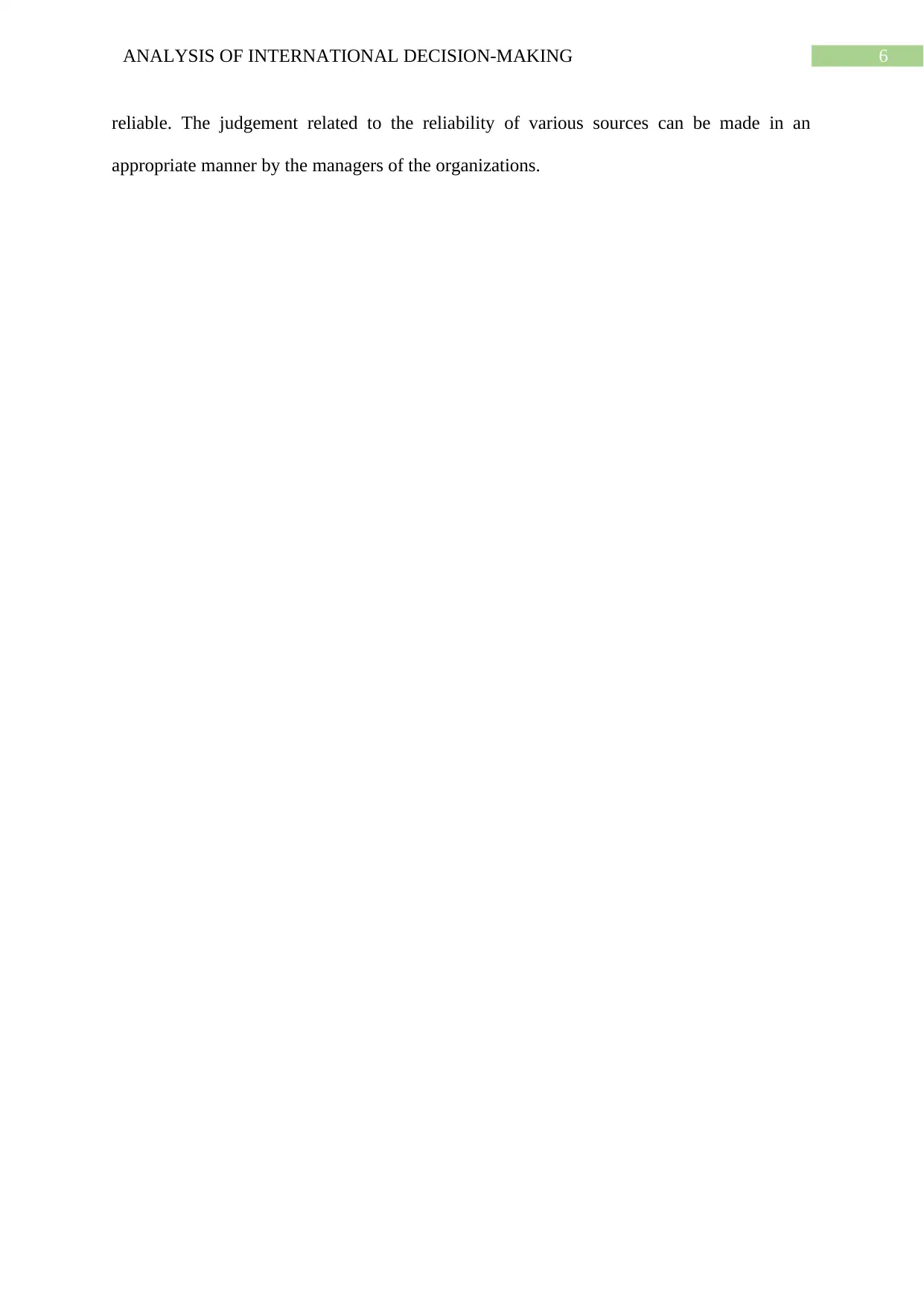
6ANALYSIS OF INTERNATIONAL DECISION-MAKING
reliable. The judgement related to the reliability of various sources can be made in an
appropriate manner by the managers of the organizations.
reliable. The judgement related to the reliability of various sources can be made in an
appropriate manner by the managers of the organizations.
Paraphrase This Document
Need a fresh take? Get an instant paraphrase of this document with our AI Paraphraser
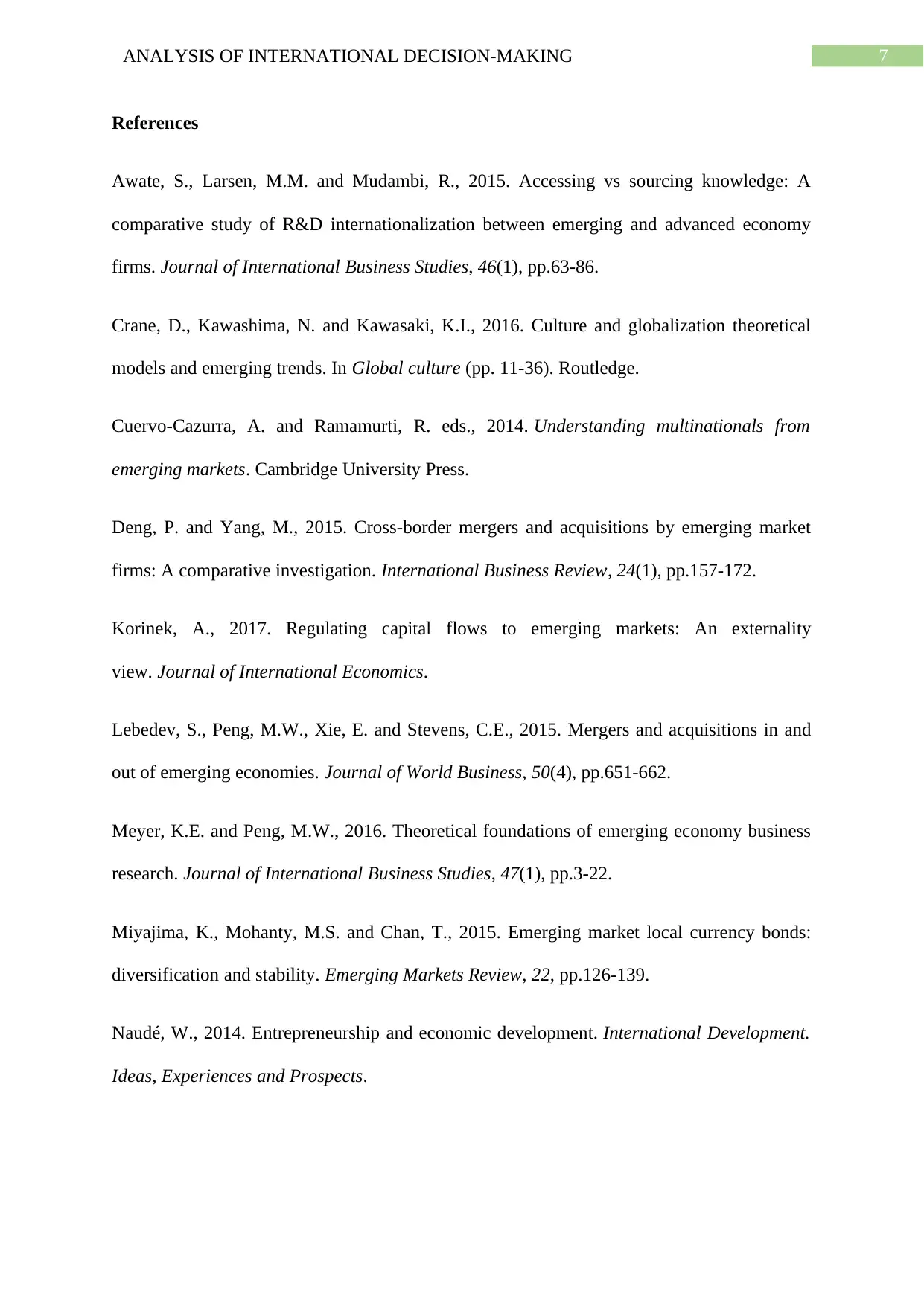
7ANALYSIS OF INTERNATIONAL DECISION-MAKING
References
Awate, S., Larsen, M.M. and Mudambi, R., 2015. Accessing vs sourcing knowledge: A
comparative study of R&D internationalization between emerging and advanced economy
firms. Journal of International Business Studies, 46(1), pp.63-86.
Crane, D., Kawashima, N. and Kawasaki, K.I., 2016. Culture and globalization theoretical
models and emerging trends. In Global culture (pp. 11-36). Routledge.
Cuervo-Cazurra, A. and Ramamurti, R. eds., 2014. Understanding multinationals from
emerging markets. Cambridge University Press.
Deng, P. and Yang, M., 2015. Cross-border mergers and acquisitions by emerging market
firms: A comparative investigation. International Business Review, 24(1), pp.157-172.
Korinek, A., 2017. Regulating capital flows to emerging markets: An externality
view. Journal of International Economics.
Lebedev, S., Peng, M.W., Xie, E. and Stevens, C.E., 2015. Mergers and acquisitions in and
out of emerging economies. Journal of World Business, 50(4), pp.651-662.
Meyer, K.E. and Peng, M.W., 2016. Theoretical foundations of emerging economy business
research. Journal of International Business Studies, 47(1), pp.3-22.
Miyajima, K., Mohanty, M.S. and Chan, T., 2015. Emerging market local currency bonds:
diversification and stability. Emerging Markets Review, 22, pp.126-139.
Naudé, W., 2014. Entrepreneurship and economic development. International Development.
Ideas, Experiences and Prospects.
References
Awate, S., Larsen, M.M. and Mudambi, R., 2015. Accessing vs sourcing knowledge: A
comparative study of R&D internationalization between emerging and advanced economy
firms. Journal of International Business Studies, 46(1), pp.63-86.
Crane, D., Kawashima, N. and Kawasaki, K.I., 2016. Culture and globalization theoretical
models and emerging trends. In Global culture (pp. 11-36). Routledge.
Cuervo-Cazurra, A. and Ramamurti, R. eds., 2014. Understanding multinationals from
emerging markets. Cambridge University Press.
Deng, P. and Yang, M., 2015. Cross-border mergers and acquisitions by emerging market
firms: A comparative investigation. International Business Review, 24(1), pp.157-172.
Korinek, A., 2017. Regulating capital flows to emerging markets: An externality
view. Journal of International Economics.
Lebedev, S., Peng, M.W., Xie, E. and Stevens, C.E., 2015. Mergers and acquisitions in and
out of emerging economies. Journal of World Business, 50(4), pp.651-662.
Meyer, K.E. and Peng, M.W., 2016. Theoretical foundations of emerging economy business
research. Journal of International Business Studies, 47(1), pp.3-22.
Miyajima, K., Mohanty, M.S. and Chan, T., 2015. Emerging market local currency bonds:
diversification and stability. Emerging Markets Review, 22, pp.126-139.
Naudé, W., 2014. Entrepreneurship and economic development. International Development.
Ideas, Experiences and Prospects.
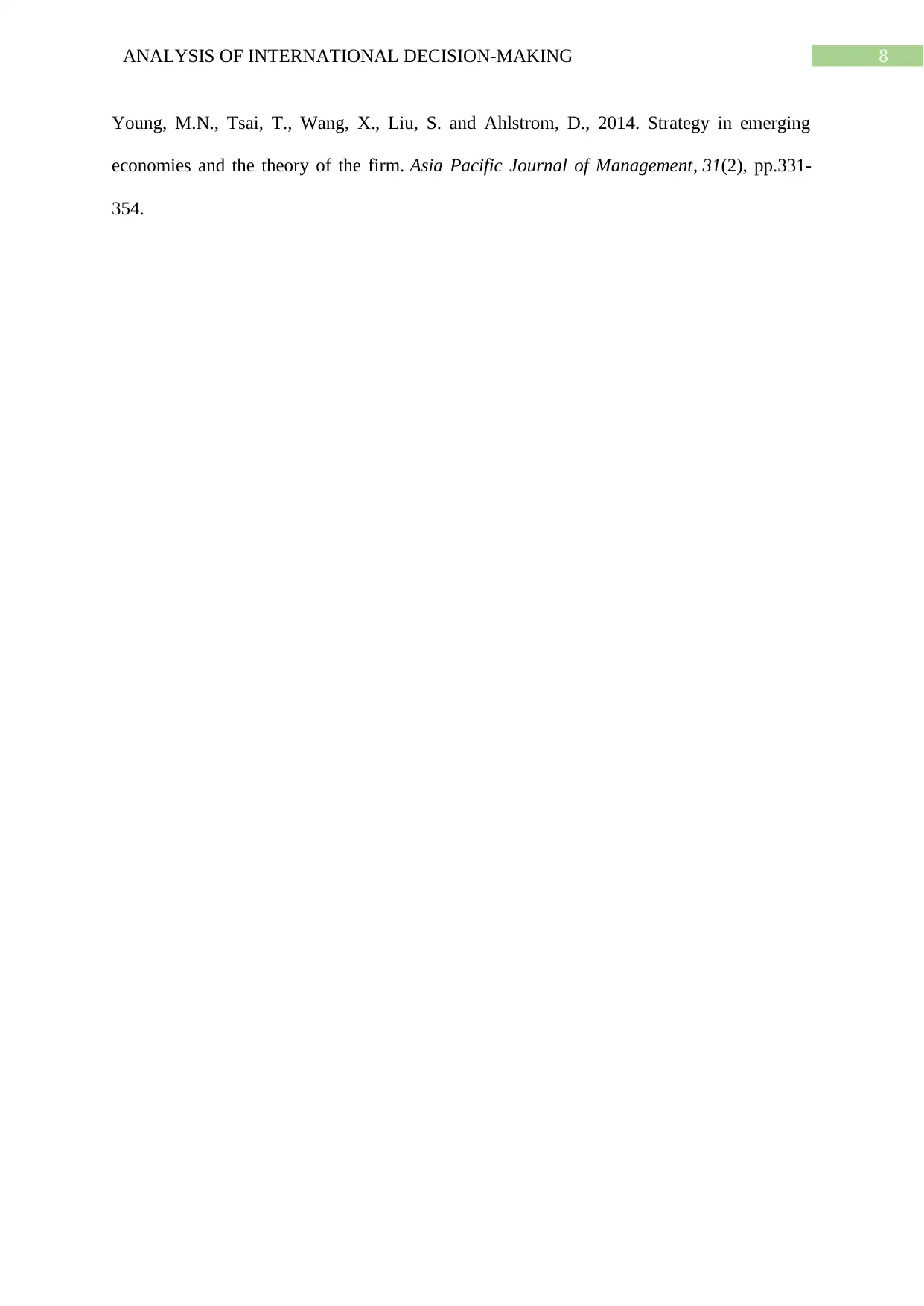
8ANALYSIS OF INTERNATIONAL DECISION-MAKING
Young, M.N., Tsai, T., Wang, X., Liu, S. and Ahlstrom, D., 2014. Strategy in emerging
economies and the theory of the firm. Asia Pacific Journal of Management, 31(2), pp.331-
354.
Young, M.N., Tsai, T., Wang, X., Liu, S. and Ahlstrom, D., 2014. Strategy in emerging
economies and the theory of the firm. Asia Pacific Journal of Management, 31(2), pp.331-
354.
⊘ This is a preview!⊘
Do you want full access?
Subscribe today to unlock all pages.

Trusted by 1+ million students worldwide
1 out of 9
Related Documents
Your All-in-One AI-Powered Toolkit for Academic Success.
+13062052269
info@desklib.com
Available 24*7 on WhatsApp / Email
![[object Object]](/_next/static/media/star-bottom.7253800d.svg)
Unlock your academic potential
Copyright © 2020–2025 A2Z Services. All Rights Reserved. Developed and managed by ZUCOL.





